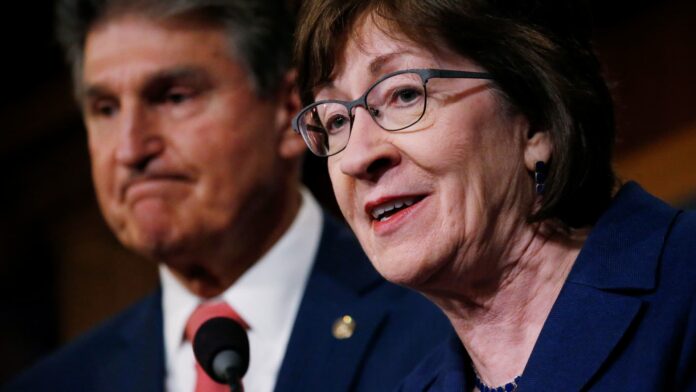U.S. Senators’ Susan Collins (R-ME) and Joe Manchin (R-WV) brief reporters.
Leah Millis | Reuters
WASHINGTON — After months of negotiating, a group of senators announced two proposals Wednesday designed to close gaps in federal law and prevent future candidates from stealing elections.
The measures — called the Electoral Count Reform and Presidential Transition Improvement Act and the Enhanced Election Security and Protection Act — are led by Sen. Susan Collins, R-Maine, and Sen. Joe Manchin, D-W.Va.
The bills seek to close loopholes that former President Donald Trump and his allies attempted to exploit in election law and stay in power despite his defeat in the 2020 election. The first bill would clarify the vice president’s role in counting Electoral College votes, raise the bar for members of Congress to object, and try to prevent fake slates of electors from interfering in the process. The second, meanwhile, is aimed at protecting election workers.
The bills come as the House’s Jan. 6 committee has held public hearings outlining evidence they have received in connection to the plot to overturn the result of the 2020 election.
“Through numerous meetings and debates among our colleagues as well as conversations with a wide variety of election experts and legal scholars, we have developed legislation that establishes clear guidelines for our system of certifying and counting electoral votes for President and Vice President,” Collins, Manchin and the rest of the Senate group said in a joint statement. “We urge our colleagues in both parties to support these simple, commonsense reforms.”
Preventing fake electors
The Electoral Count Reform and Presidential Transition Improvement Act would overhaul the 1887 Electoral Count Act by making clear the vice president’s role in confirming an election result is “solely ministerial” — that she or he doesn’t have unilateral power to reject electors. It would also raise the threshold for objecting to electors — from one House and Senate member to one-fifth of each chamber, the authors said.
The bill would also amend the Presidential Transition Act of 1963 to ensure that candidates of both parties receive resources to aid the transition, in limited circumstances “when the outcome of an election is reasonably in doubt,” according to a summary.
One of the thorniest issues for the group was how to make sure the correct electors for the winning candidate are counted. The legislation would identify the state’s governor unless otherwise specified by the state, as the person responsible for submitting the election result — an attempt to avoid dealing with competing slates of electors. The Jan. 6 committee has outlined how Trump’s team organized groups of fake electors in multiple states to try to overturn the 2020 election result in his favor; nearly a dozen false electors in Georgia have been hit with subpoenas in a criminal investigation into election interference in the state.
The bill would also provide a process for expedited judicial review, featuring a three-judge panel and the possibility to directly appeal to the Supreme Court if a candidate wants to challenge the submitted electors. “This accelerated process is available only for aggrieved presidential candidates and allows for challenges made under existing federal law and the U.S. Constitution to be resolved more quickly,” says the summary of the legislation.
And the legislation would eliminate “a provision of an archaic 1845 law that could be used by state legislatures to override the popular vote,” the summary continued.
The second bill, the Enhanced Election Security and Protection Act, would double penalties under federal law for people “who threaten or intimidate election officials, poll watchers, voters, or candidates,” the summary of the proposals said.
It would also add Postal Service guidance to improve the processes for mail-in ballots, reauthorize the Election Assistance Commission for five years and make clear that electronic election records must be preserved.
Bipartisan support
Apart from Manchin and Collins, other members of the group include Sens. Rob Portman, R-Ohio, Kyrsten Sinema, D-Ariz., Mitt Romney, R-Utah, Jeanne Shaheen, D-N.H., Lisa Murkowski, R-Alaska, Mark Warner, D-Va., Thom Tillis, R-N.C., Chris Murphy, D-Conn., Shelley Moore Capito, R-W.Va., Ben Cardin, D-Md., Todd Young, R-Ind., Chris Coons, D-Del., and Ben Sasse, R-Neb. Some members are sponsoring one of the two bills but not the other.
Senate Rules Committee Chair Amy Klobuchar said Wednesday she expects to hold a hearing on the election proposals soon.
“I believe it’ll be before the August recess. We’d like to get it done and move on this as soon as possible,” she told NBC News.
It is unclear when the legislation may come to a vote in the full Senate. With a packed calendar in the coming weeks, it is likely to be after the August recess. Some senators have also suggested that it can be voted on in the lame duck session after the midterm election.
The bills would address the process of counting and certifying the vote, a bipartisan pursuit. They largely avoid the topic of voting rights and would not set federal requirements for ballot access, a cause that Senate Republicans vigorously oppose.
Senate Minority Leader Mitch McConnell, who blessed the bipartisan negotiations months ago, reiterated his confidence in the working group in a press conference on Tuesday afternoon.
The Electoral Count Act of 1887 “needs to be fixed,” McConnell said. “And I’ve been in constant touch with Senator Collins and sympathetic with what she’s trying to achieve.”


